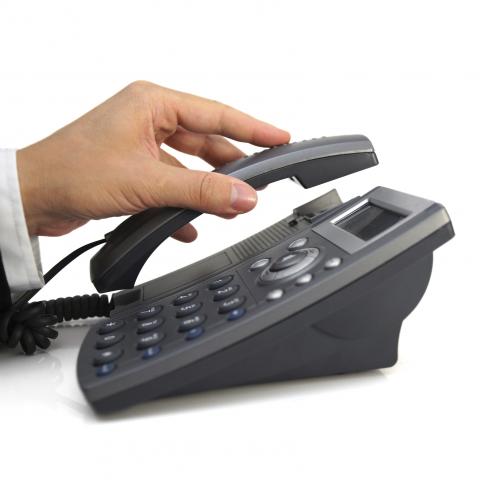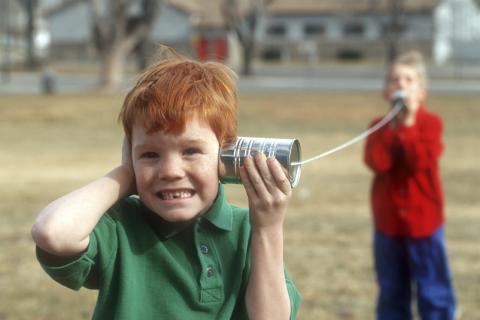
Do you sometimes get anxious when the phone rings? For some, this anxiety arises due to the fear of being criticized or judged for what they’re gonna say. Telephone phobia can even make one afraid, by association, of the actual ringing.
Even though this type of anxiety was not common for me, I noticed that taking phone calls in a foreign language could get me really tense. I would sometimes struggle to find the right words, and I was afraid I’d fail to understand what the other person wanted from me.
As a learner, picking up some French phone phrases can relieve you of most of this apprehension. Equipped with the essential phrases and useful phone vocabulary, you’ll be ready to face almost any phone scenario.
In this article, you’ll learn how to answer the phone in French and handle different components of a phone call: greetings and introductions, transferring a call, taking a message, handling connection issues, and much more. Once we’re done here, you’ll be ready to keep your cool and pick up with confidence.

No more stress: Pick up the phone with a confident smile!
 Table of Contents
Table of Contents
- Phone Vocabulary
- Greeting
- Checking
- Transferring
- Stating Your Business
- Problems
- Ending
- Le mot de la fin
1. Phone Vocabulary
Before we start with the phrases, let’s have a look at the most useful words you should know when talking about phones and calls. This short vocabulary list includes everything you need, from words to describe the hardware to some key verbs.
| Un téléphone | Phone |
| Un portable Un mobile | Mobile phone |
| Une batterie | Battery |
| Un chargeur | Charger |
| Un message Un texto Un SMS | Text message |
| Un écran | Screen |
| Une sonnerie | Ringtone |
| Un appel Un appel téléphonique | Call |
| Un coup de fil | Call [Slang] |
| Un numéroUn numéro de téléphone | Phone number |
| Appeler | To call |
| Rappeler | To call back |
| Composer | To dial |
| Sonner | To ring |
| Décrocher | To pick up |
| Raccrocher | To hang up |
| Laisser un message | To leave a message |
| Allumer | To turn on |
| Éteindre | To turn off |
| Brancher | To plug |
| Charger / Recharger | To charge |
- → Mobile phones have introduced countless new words into our lives. Here’s a list of more useful French vocabulary for using your smartphone.

Décrocher le téléphone (“To pick up the phone”)
2. Greeting
When calling someone or picking up the phone, the conversation almost always starts with a greeting of some sort. This is just basic phone etiquette.
It might be casual when you’re calling friends or answering your personal phone, or formal and informative if you’re answering in a professional capacity.
Below, you’ll find a few common phone greetings in French for making and receiving a call.
1 – Calling
| Allo. | Hello. |
| Allo is a “hello” for phone conversations only. In France, we never use allo in any other context, unlike in French Quebec where it’s also a common in-person greeting. | |
| Bonjour. | Hello. |
| When you’re calling, you could simply say Bonjour instead of Allo, then move on to introducing yourself, stating your business, or whatever comes next. | |
2 – Answering
| Allo ? | Hello? |
| When answering the phone, you can also use Allo or the interrogative Allo ? Unless you’re answering in a professional capacity, this is usually all you need to say before you know who’s calling and why. Another option is Oui, allo ? It doesn’t change much, really. | |
| Bonjour. | Hello. |
| Like when calling, you can answer with a simple Bonjour. | |
| Allo oui, j’écoute. | Hello, yes, I’m listening. |
If you’re taking a professional phone call on behalf of your company, here’s the formal and efficient way to do it:
[Company name], bonjour.
Or:
[Company name], [Your name] bonjour.
For example:
- Clinique Saint-Martin, bonjour. (“Saint-Martin Clinic, hello.”)
- Decathlon Montreuil, David Morel, bonjour. (“Montreuil’s Decathlon, David Morel, hello.”)
Then, you could add something like:
- Je vous écoute. (“I’m listening.”)
- Comment puis-je vous aider ? (“How can I assist you?”)
Beyond Allo, there are many different ways to greet someone on the phone. You’ll find lots of ideas on our list titled Common Ways to Say Hello here on FrenchPod101.com.

Oui, allo ? (“Hello?”)
3. Checking
Now that you’ve said “hello,” the next step is to make sure you’ve reached the right person (or to ask who’s calling). Once you familiarize yourself with the following French phone call phrases, you’ll be able to handle this with ease.
1 – Calling
One simple way to see if you’ve gotten the right person is to just use their name:
- David? [Casual]
- Monsieur Morel ? [Formal – Male]
- Madame Lemaire ? [Formal – Female]
Here are a few other options:
| Je suis bien chez David Morel ? | Is this the home of David Morel? |
| Je suis bien au 06 78 24 XX XX ? | Did I reach the 06 78 XX XX? |
| If you suspect you might have dialed a wrong number, this is how you would double-check. | |
| Je suis bien au cabinet du docteur Morel ? Je suis bien à la clinique Saint-Martin ? | Is this the office of Doctor Morel? Is this the Saint-Martin Clinic? |
Once you know you’re at the right place, this is a good time to introduce yourself:
| C’est Sophie. [Casual] | It’s Sophie. |
| Je m’appelle Sophie Cibat. [Formal] | My name is Sophie Cibat. |
2 – Answering
If you didn’t recognize the person calling and they haven’t introduced themselves yet, you probably want to inquire about that.
| Qui est à l’appareil ? [Formal] | Who’s this? |
| This literally means: “Who’s at the device?” | |
| Qui est-ce ? [Casual] | Who’s this? |

Qui est à l’appareil ? (“Who is it?”)
4. Transferring
At some point during the conversation, the caller may be transferred to another person or department. Here are several French phone expressions you can use to make this as smooth a process as possible.
1 – Calling
If you’ve reached the secretary of a big company or the main desk of an administration, your next step is to be transferred to the right person or service.
| J’essaye de joindre David. [Casual] | I’m trying to reach David. |
| Je cherche à joindre David Morel. [Formal] | I’m trying to reach David Morel. |
| Je cherche à joindre monsieur Morel. [Formal] | I’m trying to reach Mr. Morel. |
| Je peux parler à David ? [Casual] | Can I talk to David? |
| Tu peux me passer David ? [Casual] | Can you put David on? |
| Je voudrais parler à David Morel, s’il vous plaît. [Formal] | I would like to speak to David Morel, please. |
| Est-ce que je pourrais parler à David Morel, s’il vous plaît ? [Formal] | Can I speak to David Morel, please? |
| Je cherche à joindre le service juridique. | I’m trying to reach the legal service. |
| Est-ce que vous pourriez me transférer au service juridique, s’il vous plaît ? | Could you transfer me to the legal service, please? |
2 – Answering
| C’est de la part de qui ? | Who’s calling? |
| This is similar to qui est à l’appareil, but this phrase is used when you’re asking on behalf of the person you’ll transfer the caller to. | |
| Ne quittez pas. | Hold the line. |
| Un instant, s’il vous plaît. Un moment, s’il vous plaît. | A moment, please. |
| Je te le passe. [Casual] Je vous le passe. [Formal] Je vous mets en relation. [Very formal] | I’ll put him on. I’ll put him on. I’ll put you through. |
| La ligne est occupée. | The line is busy. |
| Elle n’est pas disponible pour le moment. | She’s not available right now. |
| Est-ce que je peux prendre un message ? | Can I take a message? |
| Je peux lui demander de vous rappeler. | I can ask him/her to call you back. |
| Pouvez-vous me laisser votre nom et votre numéro ? | Can I take your name and number? |
- → To learn and practice some more useful phrases for your phone conversations, check out our vocabulary list with audio recordings.

Je suis désolée, la ligne est occupée. (“I’m sorry, the line is busy.”)
5. Stating Your Business
There could be many reasons why you’re making a phone call. Maybe you want to discuss a casual topic with a friend or perhaps you’re calling for serious business matters.
| J’appelle pour prendre de tes nouvelles. | I’m calling to check on you. |
| Tu as essayé de m’appeler tout à l’heure. | You tried to call me earlier. |
| Je voudrais parler à quelqu’un d’un problème juridique. | I would like to talk to someone about a legal issue. |
| Je voudrais prendre rendez-vous. | I would like to make an appointment. |
| Je vous rappelle après avoir reçu un message. | I’m calling you back after receiving a message. |

Tu as essayé de m’appeler tout à l’heure. (“You tried to call me earlier.”)
6. Problems
Nowadays, smartphones and the internet are making “wrong number” situations rather unusual, but there are still many other issues that might come up.
Compared to old models that could last for days on a single charge, the curse of smartphones is the short battery life…you never know if it’ll die on you in the middle of a call. There are also lots of opportunities for a bad connection, like if someone drives through a tunnel and breaks up unexpectedly.
| Je t’entends mal. [Casual] Je vous entends mal. [Formal] | I can’t hear you. / I can barely hear you. |
| Je t’entends plus. [Casual] Je ne vous entends plus. [Formal] | I can’t hear you anymore. |
| La connexion est mauvaise. | The connection is bad. |
| Il y a de la friture sur la ligne. [Casual – Idiom] | There is noise on the line. |
| Literally: “There is something frying on the line.” | |
| Tu peux répéter ? [Casual] Vous pouvez répéter, s’il vous plaît ? [Formal] | Can you repeat? Could you repeat, please? |
| On a été coupés. | We got cut off. / We got disconnected. |
| Ma batterie est bientôt morte. [Casual] | My battery’s almost dead. |
| Ma batterie est presque épuisée. | My battery’s almost depleted. |
| Je n’ai presque plus de batterie. | I’m almost out of battery. |
| Vous vous trompez de numéro. | You’ve dialed the wrong number. |
| Désolé, je me suis trompé de numéro. | I’m sorry, I’ve dialed the wrong number. |

La connexion est mauvaise ! (“The connection is bad!”)
7. Ending
Ending the call is usually as easy as greeting the other person. It’s just a quick formality that only gets a bit more complicated in professional contexts.
| Au revoir. [Formal] | Goodbye. |
| Salut ! [Casual] | Bye! |
| Bonne journée. | Have a good day. |
| Merci, au revoir. | Thank you, goodbye. |
| Merci pour votre appel. [Formal] | Thank you for calling. |
| À bientôt. | See you soon. |
| À tout à l’heure. | See you later. |
- → For more options, be sure to check our vocabulary list The Most Common Ways to Say Goodbye. The phrases here can all be used to end a phone call.
8. Le mot de la fin
In this guide, you’ve learned everything about phone calls in French, from basic phone vocabulary to specific phrases for greeting, introducing yourself, stating your business, transferring a call, taking a message, and more.
Did we forget any important phone phrases you’d like to learn?
FrenchPod101 also has tons of vocabulary lists with audio recordings, free resources to boost your studies, and plenty of fun audio/video lessons to keep your French learning fresh and entertaining!
Remember that you can also use our Premium PLUS service, MyTeacher, to get personal 1-on-1 coaching. Your own private teacher can help you practice any new French words you’ve learned, and more. They can also provide you with assignments, personalized exercises, and recorded audio samples just for you—all this in addition to reviewing your work and helping you improve your pronunciation.
Happy learning on FrenchPod101.com!
About the Author: Born and bred in rainy northern France, Cyril Danon bounced off various jobs before leaving everything behind to wander around the wonders of the world. Now, after quenching his wanderlust over the last few years, he’s eager to share his passion for languages.










